 |
|
|
 |
 |
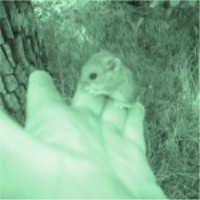
The Best Laid Plans of Mice and Men
But, Mousie, thou art no thy lane
In proving foresight may be vain:
The best laid schemes o' mice an' men
Gang aft a-gley,
An' lea'e us nought but grief an' pain,
For promised joy.
From Robert Burns' poem To a Mouse, 1786
-
Do people solve problems logically?
-
How did human logic capabilities evolve?
-
Can we solve problems better in a social setting than in an abstract format?
-
Why do we have such difficulty in reasoning with probabilities, but do better when such problems are considered as a question of frequency of incidents?
-
Is it because our distant ancestors faced frequencies of events, but that probability is a recent mathematical invention that we are poorly adapted to solve?
-
Did evolving social complexity require our pre-human ancestors to find ways to improve their gamesmanship by evolving an increased capacity for deceit and related self-deception?
-
Did this evolution of the unconscious mind and its attendant talent for gamesmanship, self-deception and lying, also predispose it to an excess of optimism?
-
What are the implications for the modern highly organized, technological world of predispositions adapted to the ancestral existence of hunter-gatherers?
|

To thine ownself be true.
Perhaps, we humans are factually unrealistic in assessing our chances of success. Perhaps it is a function of our evolution that we normally overestimate our chances of success in a situation. David Livingstone Smith suggests that normality may rest on a foundation of self-deception. He cites studies that conclude that depressed persons have a better grasp of reality than “normal” persons do and that these “depressives”, who are largely seen as being mentally ill, may in fact be suffering from a deficit of self-deception.
|
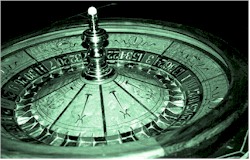
Give luck a chance.
Perhaps one of the consequences of the development of the unconscious mind in the evolution of man, and its inclination toward self-deception, is that we are overly optimistic about our chances of a successful result in situations that involve risk. Certainly the so called Gaming Industry is tapping into a fundamental flaw in the human psyche by exploiting this optimism differential. This exploit allows them to relieve millions of people of billions of dollars in gambling losses, primarily because over optimism provided a survival and reproductive advantage to our ancestors in facing the challenges of their Ice Age hunter-gatherer world.
|

Man, the Great Pretender
Did the unconscious mind and its susceptibility to self-deception evolve to help us survive? And would this self-deception be inclined toward unwarranted optimism?
David Livingstone Smith has argued that evolving social complexity required our pre-human ancestors to find ways to improve their gamesmanship as they participated in a practice he calls “social poker.” According to Smith, this led to advances in intellect and an increased capacity for deceit and deceit’s handmaiden, self-deception; the purpose of which was to improve our ability to more fully lie to others. Smith concludes that the evolution of the unconscious mind made all this possible and became part of the deep structure of our humanity.
Citing studies that suggest that “normal” people do not have as accurate an assessment of “reality” as do depressed persons, Professor Smith further concludes that such “depressives” may be suffering from “a deficit of self-deception.” Would we expect that, in addition to self-deception promoting gamesmanship and lying, it would encourage an excess of optimism? And if so, why would such excessive optimism be advantageous to (in the "genetic interest" of) someone in our ancestral environment?
It would seem to be common wisdom that an optimistic outlook is essential to success in everything from a sports competition, to a business venture, to a military campaign. Our own experience has demonstrated that when a football team is down by substantial points in the fourth quarter, the only chance they have of securing victory is by first believing that they can. No matter how improbable it is that they can overcome their deficit, the only real chance available to them begins with unbridled optimism.
Now, of course, this might not be a good idea if we were investing significant resources on the outcome. In that event we would want a more realistic approach. But for the team on the field, with everything to gain, and little to lose, optimism should be the order of the day.
Well how does this situation stack up against circumstances in the EEA— the environment of evolutionary adaptation? According to Robert Wright in his book The Moral Animal, “The question, properly put, is always whether a trait would be in the ‘genetic interest’ of someone in the EEA, not in modern America or Victorian England or anywhere else. Only traits that would have propelled the genes responsible for them through the generations in our ancestral social environment should, in theory, be part of human nature today.” So would unrealistic optimism be beneficial to ancestral hunter-gatherers?”
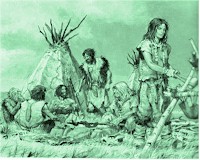 For sake of illustration, let us consider the problems and concerns facing these ancestors. They would, in all likelihood be living on the edge of subsistence with no safety net. As nomadic people, their food reserves would be, of necessity, limited to days or weeks at most. The challenges and dangers they would face on a daily basis would be formidable. It should be enough to make a realistic ancestor quite depressed. So, it would seem, a healthy dose of unbridled optimism directed by an unconscious mind designed to hide the truth about a situation from ourselves, would bestow a significant advantage upon those so possessed. This would be especially true given that there was probably little choice available to said ancestor as to where else to invest his efforts or resources. To be rather blunt, he would have to play the hand life dealt him and would likely fare better if he could hope it was a winning hand. For sake of illustration, let us consider the problems and concerns facing these ancestors. They would, in all likelihood be living on the edge of subsistence with no safety net. As nomadic people, their food reserves would be, of necessity, limited to days or weeks at most. The challenges and dangers they would face on a daily basis would be formidable. It should be enough to make a realistic ancestor quite depressed. So, it would seem, a healthy dose of unbridled optimism directed by an unconscious mind designed to hide the truth about a situation from ourselves, would bestow a significant advantage upon those so possessed. This would be especially true given that there was probably little choice available to said ancestor as to where else to invest his efforts or resources. To be rather blunt, he would have to play the hand life dealt him and would likely fare better if he could hope it was a winning hand.
It is fairly obvious that unwarranted optimism would be dysfunctional in a situation where we would have a range of choices available to us, such as making investments in the stock market. Many modern investors have learned the hard way that companies' forward looking prospectuses can be too upbeat. But stock investing, business strategies, long range planning, etc., were clearly not part of our ancestral environment. In that setting, man would be given a rather small range of choices as he approached each day and he would have found that, as Yogi says: “predictions are very hard to make, especially about the future.”
It would seem that in such circumstances, a heavy dose of optimism would be just what the doctor ordered, as these early men faced the difficulty and austerity of their daily routine. Those possessed with an upbeat attitude, even if based on unconscious self-deception, would likely fair better themselves and build more social cohesiveness within their team. They would survive better than other groups that did not have such propensity, and given their newly evolved unconscious mind, the lack of conscious control in this area could protect these “pretenders” against the discouragements and desperations that their situation may have often presented. As Robert Wright has noted, “there has been no reason for every evolved behavioral tendency to fall under conscious control. In fact, sometimes it is emphatically not in our genetic interest to be aware of exactly what we are doing or why.”
As we have noted elsewhere, genes inducing behaviors that improve survival will increase at the expense of those that are less advantageous. Edward O. Wilson has stated that the architecture of our brain is designed the way it is because such design, “promotes the survival and multiplication of the genes that direct its assembly.” Accordingly, behaviors that wound up being good for our ancestors' genetic legacies have flourished, and those leading to less productive behaviors have not.
It should also be clear that behaviors which our genes encoded for success in the world of some 40,000 years ago, do not necessarily promote success in the modern environment of a twenty-first century technological society. Like the “sweet tooth” that gave our ancestors a predilection for ripe fruit, but today leads to obesity and diabetes, such genetically encoded behaviors are not easily extinguished. Our brains, especially in their unconscious aspects, are still adapted to the ancestral existence of hunter-gatherers, for which they are ideally designed; and still propel us toward success in the environment of those ancestors which is where our unconscious minds both expect us to live and think we still are.
|
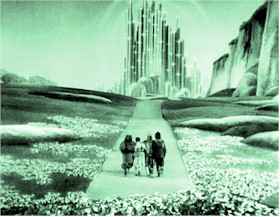
In the Land of Hope and Dreams
If our speculation is correct, how does undue enthusiasm affect our lives and attitudes, and how do people who don’t share this optimism appear to us?
Like all characteristics, genetically encoded or otherwise, it is reasonable to assume that optimism among humans would follow more or less a normal distribution. Even if the median value was higher than a reality check would warrant, there would be some among our ancestors, and indeed among us today, who would by their nature be more pragmatic. We have already seen the argument made for the survival advantage that protection against discouragements would have, but would there be a need among bands of early humans for a few naysayers? Perhaps such cynics could provide a needed second opinion in situations where the group really needed to apply the brakes before going over the cliff (both figuratively and literally). If so, we should understand that the forces of natural selection would infuse a sprinkling of worry genes among successful bands of hunter-gatherers in the ancestral environment.
This is of course speculative reasoning, as opposed to factual knowledge (which is very rare – how much is really knowable) but it does seem reasonable. Suffice it to say that no matter what the mechanism of natural selection was in this area, we are aware today that human personalities are distributed along a continuum, ranging from depressed worrywarts to romantic idealists. Whether such a distribution follows a normal bell shaped curve as do other characteristics like intelligence, we will leave to further research. What appears to be true is that median level of optimism is somewhat higher than the facts of life would seem to justify and whole industries, from advertizing, to gambling, to credit cards seem to depend on this.
What then of those among us who suffer from this “deficit of self-deception?” Will human nature with its ample supply of optimistic enthusiasm always label them as spoilsports, killjoys, and defeatists? Well if we watch how the political campaigns handle such issues we would likely conclude, yes.
Politicians seem to know, or at least act is if they know, that voters are drawn to optimism, no matter how unrealistic, no matter how untruthful, no matter how self-deceiving. Political campaigns are overflowing with promises that cannot be kept, made by candidates whose elected offices lack the 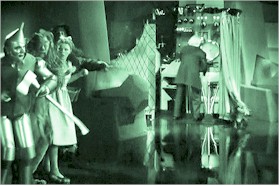 power to deliver on them even if it was their sincere intention. power to deliver on them even if it was their sincere intention.
Professor Marvel’s words to Dorothy seem appropriate here, “Pay no attention to the man behind the curtain!” The inhabitants of Oz desperately wish to believe that their Wizard can deliver; it’s in their genes.
|

Inconvenient Truths
What kind of reception, then, can “realists” among us expect to receive? What of the “inconvenient truths” they intrude upon us? Do brains predisposed to optimistic outcomes, by their adaptation to the ancestral existence of hunter-gatherers, welcome or reject the bearers of cautionary advice?
When we witness miscalculations by our leaders in major undertakings that result in disasters, we properly ask, where were the advisors who should have counseled caution? Was the intelligence inaccurate, or were those in a position to know better, afraid to confront the unjustified confidence of the group? The role of such a counselor, in theory at least, is to “bring truth to power.” But how are such skeptics treated, even when they are right? A recent pundit’s comment on this was clarifying: “Everybody wants to have a good meeting with the boss.” If the boss and his inner circle want to believe in an easy victory, opposition can be very unwelcome.
We must always keep in mind that when we witness the interplay of evolved behavioral tendencies, with modern institutions, we are not witnessing the circumstances in the EEA— the environment of evolutionary adaptation. That is to say there may be major differences between the conditions of a tribal council of 20,000 years ago, and a modern meeting of career professionals at the highest levels of government. The circumstances of institutionalized civilization and those of ancestral hunter-gatherers are extremely dissimilar.
|
We are all aware that dissent is often punished in our civilized institutions. After Athenian power declined around 400 BC, following a series of failed military campaigns, the citizens of Athens felt the need to place a share of the blame on the city’s most famous nuisance, Socrates. His main offense was that he had irritated Athenians by posing too many upsetting questions. His actions were said to have corrupted the Athenian youth and demoralized the society, thereby undermining the nation and contributing to its decline. Their response to his perceived negativism, a prepared hemlock beverage.
Perhaps matters would be very different in the tribal council of ancestral hunter-gatherers where dissent may not risk a career ending incident after a lifetime devoted to climbing the ladder of success; nor result in death by hemlock for being the city gadfly. Although we don’t have a time tunnel to examine the personalities of these ancestral council members, we do have accounts of what we might envision as similar peoples from descriptions of more recent hunter-gatherers. The American Indians of the Great Plains would appear to have shared an environment and set of surroundings not unlike ancestors of 10,000 BC. In an anthology published by E. Adamson Hobbel he describes the nineteenth century Cheyenne personality:
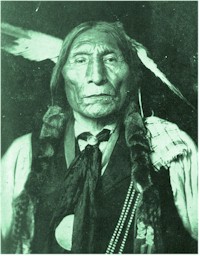
Reserved and dignified, the adult Cheyenne male moves with a sense of self-assurance. He speaks fluently, but never carelessly. He is careful of the sensibilities of others and is kindly and generous. He is slow to anger and strives to suppress his feelings, if aggravated. Vigorous on the hunt and in war, he prizes the active life... He is neither flighty nor dour. Usually quiet, he has a lightly displayed sense of humor... He does not show much creative imagination in artistic expression, but he has a firm grip on reality. He deals with the problems of life in set ways while at the same time showing a notable capacity to readjust to new circumstances. His thinking is rationalistic to a high degree and yet colored with mysticism. His ego is strong and not easily threatened. His superego, as manifest in his social conscience and mastery of his basic impulses, is powerful and dominating. He is "mature"—serene and composed, secure in his social position, capable of warm social relations.
This does not sound like a person who would be easily vexed by dissent, nor reluctant to speak his mind in council; and while team spirit and enthusiasm in time of war or conflict were no doubt valued, so too would be wisdom and guidance. We can therefore envision evolved brains with features predisposed to optimism and also to tolerance for dissent; but designed to function in a more egalitarian world where no one needed to be concerned about ending their career by displeasing the boss. But that was then and this is now.
|
Where never is heard a discouraging word.
|
|
 |
|
|
 |
|
|
 |
|
Copyright by OnHumanNature.com 2008
|
|
|
 |